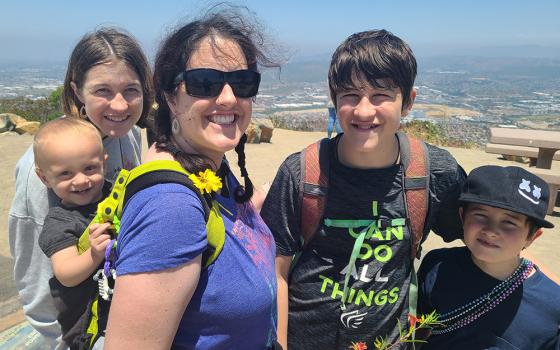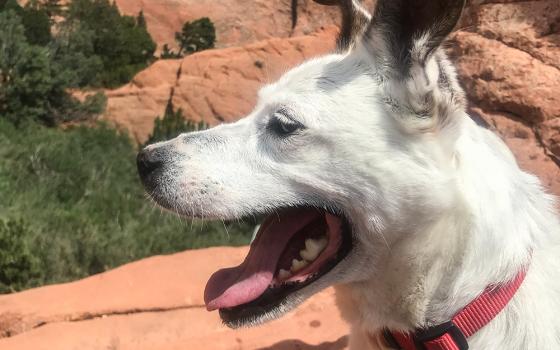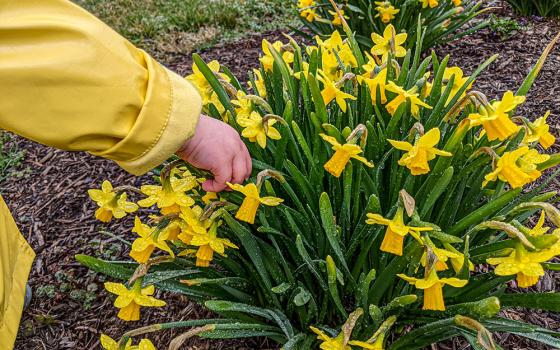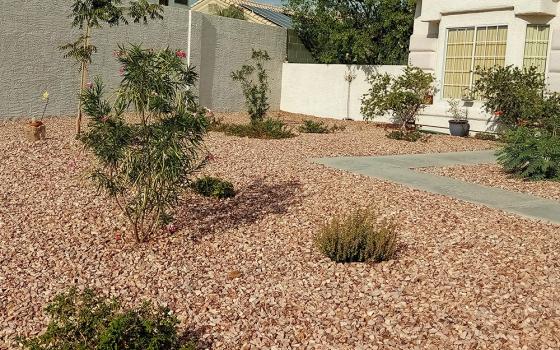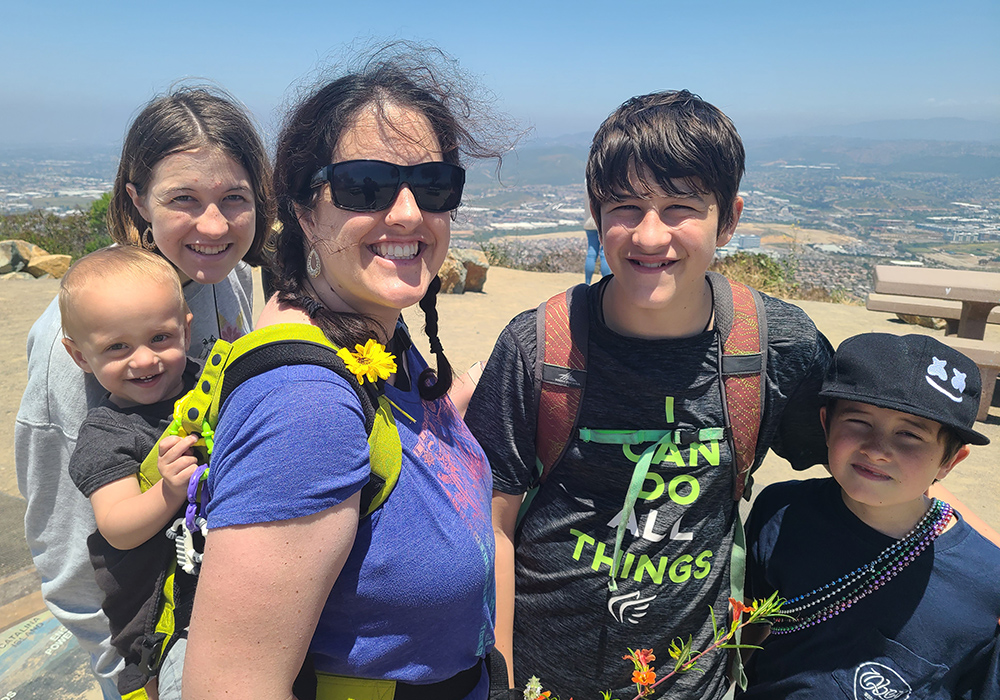
Elisa Johnston and her kids are pictured at Double Peak Park in San Marcos, California, on Mother's Day 2023. (Courtesy of Elisa Johnston)
"Moooom, you're so white," my daughter rolled her eyes as I corrected her on throwing something into the trash can instead of the recycle bin. Her words startled me. What did being white have to do with recycling? She explained that I am just too globally conscious, something that her peers have stereotyped as a "white mom thing."
This awkward conversation was my cue that I was missing the mark on raising my kids to be creation-keepers. I had assumed that simply by being part of our family they were learning the responsibility to be guardians of God's creation is deeply rooted in our Christian beliefs — not a current trend or personal obsession of their mother's. Apparently, I needed to be more intentional with my creation-keeping lessons.
When launching my book, Justice-Minded Kids: Bite-sized challenges to empower kids to practice justice, compassion, and love, I had collected Bible verses for each lesson as part of the downloadable resources for parents. I was surprised by the verses I found to accompany the section about creation care.
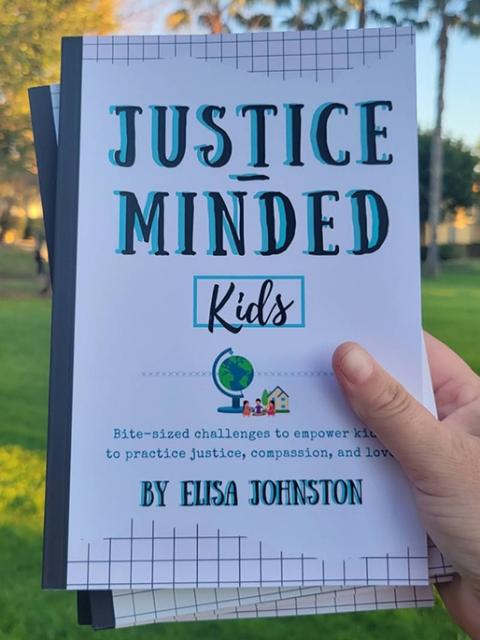
Copies of Elisa Johnston's book Justice-Minded Kids (Courtesy of Elisa Johnston)
I've read the Bible many times, especially the Psalms, where the beauty of nature is lauded on almost every page, but there were other relevant passages I hadn't remembered. In Romans, creation groans to be liberated from decay and for future restoration (8:19-21, New International Version). Proverbs tells us: "The righteous care for the needs of their animals" (12:10, New International Version). Leviticus informs us on rightful land ownership: "The land belongs to me. You are only foreigners and tenant farmers working for me. With every purchase of land you must grant the seller the right to buy it back" (25:23b-24, New Living Translation). Deuteronomy instructs not to destroy trees during war (20:19).
Honestly, I felt a little hypocritical. Here I was with a book equipping parents to raise "justice-minded kids" — which included environmental stewardship — and yet, it seemed I hadn't done this well with my own children. I knew their schools taught about environmental care. We'd had conversations about not being wasteful and we always follow the National Parks Junior Ranger commitment to "leave no trace." But I hadn't done much to connect this value of caring for creation to our faith.
Based on previous conversations with my kids, the "why" they had received from science class for environmental protection was "so we don't die, but we probably will anyway." During these weeks of study, they always came home from school seeming depressed and hopeless.
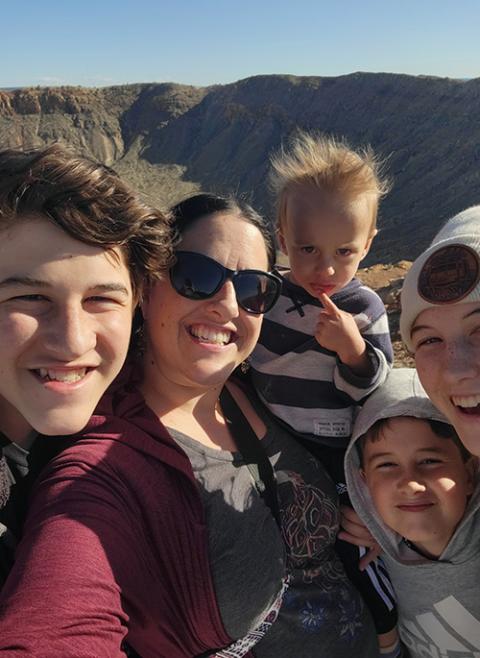
Elisa Johnston and her kids at Meteor Crater National Landmark, in Winslow, Arizona, in March 2024 (Courtesy of Elisa Johnston)
I thought about the Bible verses that articulate why we should value creation care. The "why" I find in the Bible might not erase the consequences of our collective human abuse of nature, but it does give us the hope of restoration and a purpose as stewards of what God called "good."
I was determined to reconnect my kids with this biblical motivation to be keepers of creation. I resolved to use my own plan and lean into the advice I had written for parents who were reading my book. It was exactly what this reinvigorated version of myself needed, too.
The kids keep growing, government policies change and environmental degradation becomes more visible. In the continuity of life, it is sometimes hard to see what is in our circle of control. As parents, raising creation-keepers is an area of justice over which we have profound influence. Here are five ways to help raise creation-keepers in your own home.
1. Deepen awe
"How many are your works, Lord! In wisdom you made them all; the earth is full of your creatures. There is the sea, vast and spacious, teeming with creatures beyond number — living things both large and small."
—Psalm 104:24-25 (New International Version)
Admiring the beauty of creation is one of the easiest things for me to implement with my family. We already love being outside in nature and occasionally geek out about eclipses, dolphins and waterfalls. But celebrating the stunning diversity of creation is something I can do in more basic ways, too. I can help my kids marvel at how their bodies work, point out the intricacies of the leaves budding on the tree outside the window and admire our cat's entertaining instincts. Respect for the natural world starts with appreciation, and this awe isn't dependent on expensive trips to stunning views. It is available to all of us, starting at home.
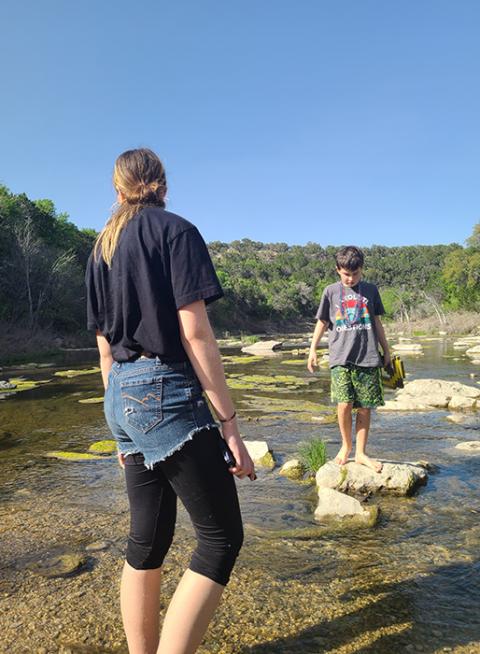
Elisa Johnston's kids at Dinosaur Valley State Park, Texas, in March 2023 (Courtesy of Elisa Johnston)
2. Communicate the 'why'
"The earth is the Lord's, and everything in it, the world, and all who live in it."
—Psalm 24:1 (New International Version)
Although I hoped my kids would pick up the responsibility I felt for creation just by watching me model it for them, I don't think they have. I have been working on improving how I communicate why I do what I do — which is because all of creation belongs to God and I'm God's steward. I must both explicitly discuss the "why" and visibly model the value of creation care.
3. Practice confidence-boosting actions together
"The Lord God took the man and put him in the Garden of Eden to work it and take care of it."
—Genesis 2:15 (New International Version)
Justice-Minded Kids lists actions to do with kids, but creation-keeping goes beyond doing a few small things a few times. What I hope these actions accomplish is to develop kids' confidence to take ownership of creation-keeping. If they feel equipped in small ways, like picking up trash, then when they become adults hopefully they will choose what is good for the environment in their wider areas of influence, even if peers disagree. Small actions can build up our identity as creation-keepers, then our identity can drive our future actions.
Advertisement
4. Recognize your family's unique influence
"For in him all things were created: things in heaven and on earth, visible and invisible ... all things have been created through him and for him."
—Colossians 1:16-17a (New International Version)
I hope to inspire each of my kids to see themselves as uniquely created by God. They each have distinct talents, interests and spheres of influence where they can practice creation care. I encourage one child to ask questions about the sustainability of a video game company. I ask another child to think about the ways robotics are used in the environment for good. I watch a movie with another child about slow fashion, while helping my preschooler reuse paper waste for creative projects. When we empower our kids this way, they begin to think critically about what is good for the environment in the areas they are uniquely designed by God to engage in.
5. Give kids voice
"The righteous care for the needs of their animals."
—Proverbs 12:10a (New International Version)
One of my favorite parts of parenting justice-minded kids is seeing the creative and innovative ways that they rise up to meet challenges and gaps in the world. Kids aren't just people we parent, they are also equal partners in change. I am curious what will happen during our next family meeting when I ask my kids to offer their own ideas on how, as a household, we can practice better stewardship of the environment. Through invitations like this, their own sense of ownership can grow.




